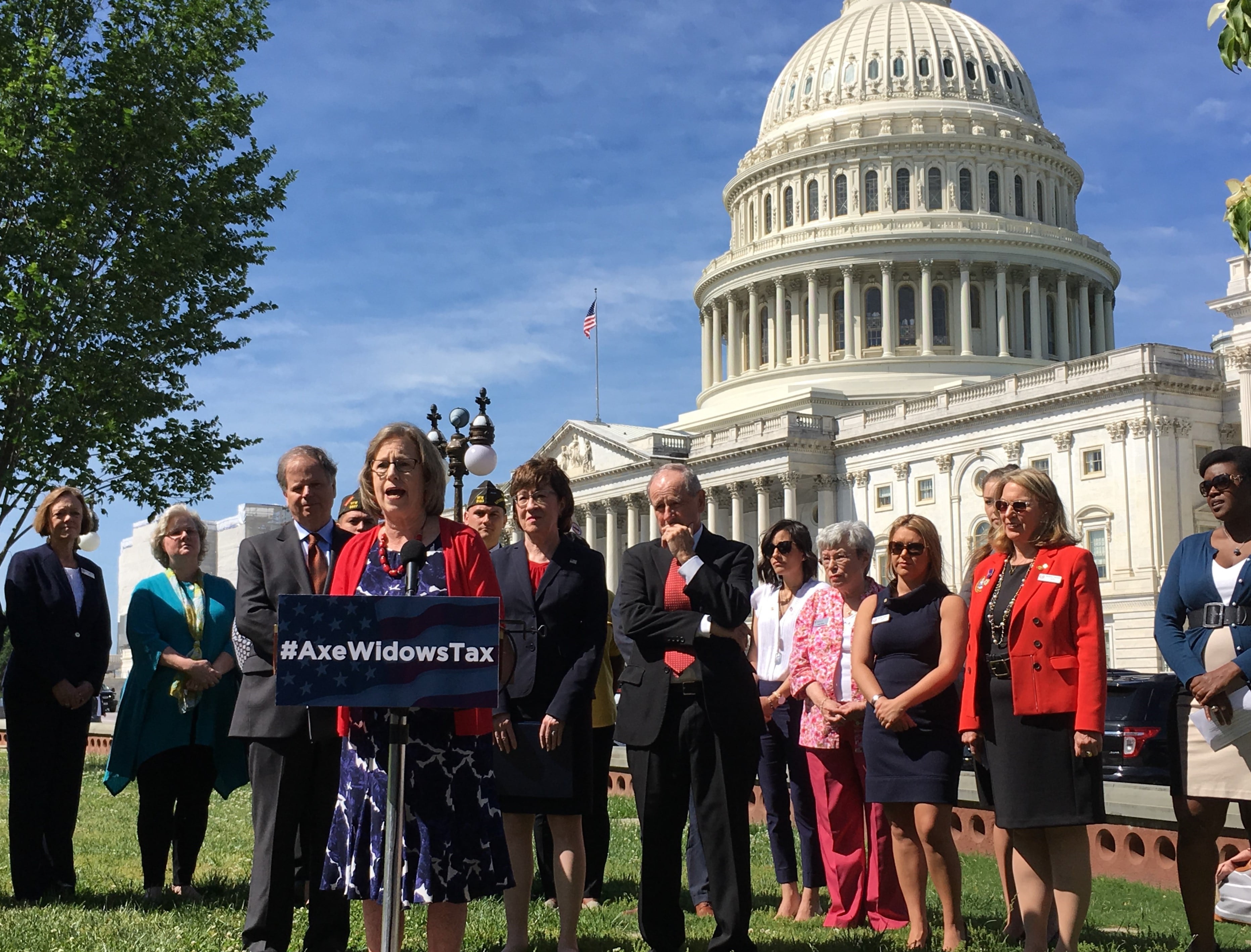A move to a fix on the military’s “widows tax” failed Thursday after Senate leadership blocked plans to include it the fiscal 2020 defense authorization debate.
While advocates are hopeful they advance the issue, if their attempt in the House next month also fails, it could mean the end of efforts this year to address a situation affecting more than 65,000 military families nationwide, costing each an average of about $11,000 annually.
“We’re incredible disappointed today,” said Kelly Hruska, Government Relations Director for the National Military Family Association. “But we have other options, and we are exploring every one of them to make sure this gets done this year.”
RELATED

On Thursday, Alabama Democratic Sen. Doug Jones took to the Senate floor just before the vote on the Senate’s annual defense authorization measure in an attempt to add a repeal of the “widows tax," calling it an issue of fairness and justice.
“We have turned our backs for over 40 years on military families,” he said. “We have turned our backs on the widows of the very men and women who have given their lives to protect this country.”
Advocates say the problem rests with how the government treats two separate military survivor payouts. The first, the Dependency and Indemnity Compensation program, awards around $15,000 a year to survivors of veterans or troops who die of service-related causes. There is no cost to troops or families to enroll.
The other, the Survivor Benefit Plan, gives families of military retirees who enroll up to 55 percent of their loved ones' retirement pay after the veteran dies. The life insurance-type payouts are subsidized by DoD, but require enrollees to pay-in part of their retirement benefit to be eligible.
Individuals who qualify for either SBP money or DIC benefits receive full payouts from the respective programs. But family members who qualify for both are subject to an offset, where for every dollar paid out in DIC their payouts under SBP are reduced by one dollar.
That costs those families up to $1,000 a month in payouts advocates insist they deserve. Some families have avoided the offset penalty by transferring benefits into their children’s accounts, but that creates other complicated tax issues.
Jones noted that 74 other senators have signed onto his legislation to fix the problem and restore full funding to the families. But the price tag — $5.7 billion over 10 years — has caused budget problems for members of Congress looking to advance the idea.
Senate Armed Services Committee Chairman Jim Inhofe, R-Okla. and one of the 74 co-sponsors, blocked Jones’ parliamentary moves because of the financial questions and other unnamed senators’ objections.
“I support and will continue to support the permanent fix,” he said. “It's going to happen. We're going to do it … but it can’t be on this bill.”
But efforts to pass the fix as a stand-alone measure have floundered in recent years, and advocates have been eyeing the defense authorization bill as a vehicle for their work because it has passed Congress annually for more than five decades.
“We’re incredibly disappointed that there’s not going to be a Senate amendment to the NDAA on this,” said Ashlynne Haycock, Deputy Director for Policy and Legislation at the Tragedy Assistance Program For Survivors. “But we’re still hopeful we can see it on the House side.”
Jones told the advocates he has discussed the issue with House Democratic leadership and believes they will add the proposal to their draft. If they do, the topic will be among the issues up for negotiation as the two chambers reconcile their separate defense policy bill drafts.
If it isn’t included before the House finalizes their draft, however, it can’t become part of those discussions or the final bill draft.
RELATED

Hruska said advocates are working on offsets for the cost and optimistic they can give House leaders a clearer financial plan for the costs of fixing the issue. But the groups also argue that families shouldn’t have their money taken away unfairly because Congress can’t settle on a permanent fix.
Several dozen advocates — including family members of deceased service members — packed the Senate gallery for Thursday’s failed bid by Jones. Most vowed they’ll return to Capitol Hill again after the July 4th break, when the House takes up its work on the defense bill.
“But we’re not going to give up, and we’re not going to stop trying,” Jones said after the vote. “I’m going to keep working with leaders in both the Senate and the House to try to get this passed.
“It’s just the right thing to do, so I’m going to keep fighting until it’s done.”
Leo covers Congress, Veterans Affairs and the White House for Military Times. He has covered Washington, D.C. since 2004, focusing on military personnel and veterans policies. His work has earned numerous honors, including a 2009 Polk award, a 2010 National Headliner Award, the IAVA Leadership in Journalism award and the VFW News Media award.




